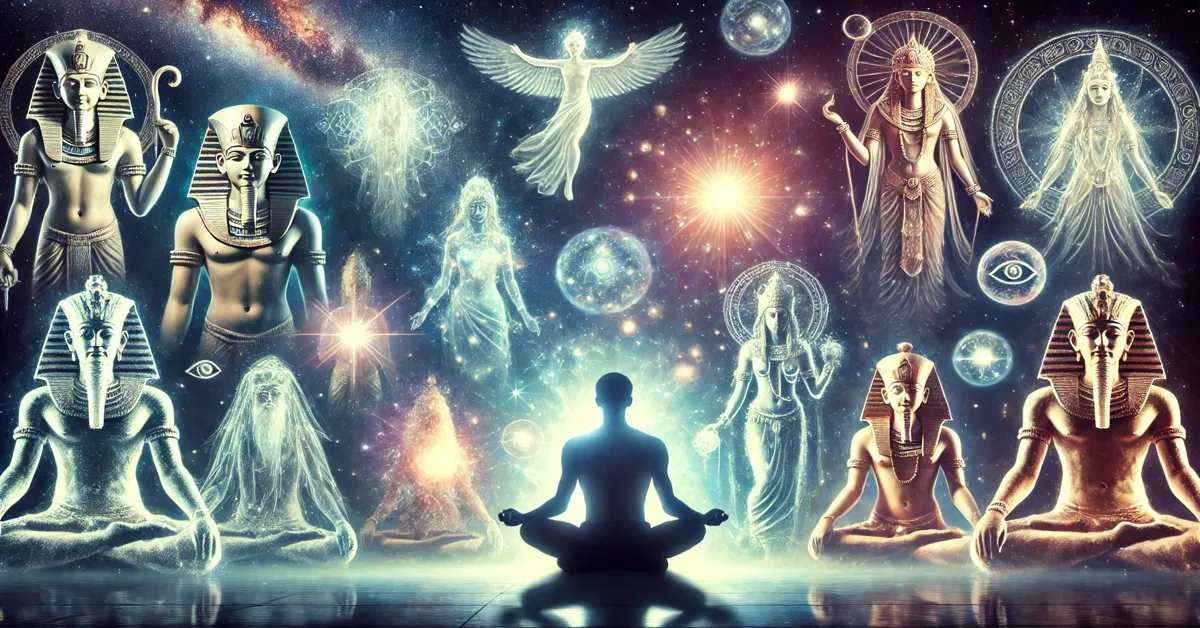Throughout human history, the concept of divine beings, gods, and goddesses has fascinated cultures worldwide. From the vast pantheons of ancient civilizations to the personalized deities worshiped by smaller communities, gods and goddesses have always played a central role in the spiritual and daily lives of people. This fascination has extended to the modern era, where spiritual seekers, mystics, and religious devotees continue to experience divine encounters in various forms.
When one says, “I talk to many gods and goddesses,” it raises several intriguing questions about the nature of these divine interactions, the identity of these deities, the purpose of such communications, and their impact on the individual. In this article, we will explore these conversations with gods and goddesses, drawing from historical, cultural, spiritual, i talk to many gods and goddesses and psychological perspectives. We will look at the implications of such experiences, the diversity of gods and goddesses across different traditions, and the ways these conversations influence the lives of individuals and communities.
The Concept of Divine Conversations
Talking to gods and goddesses is not a new phenomenon. Throughout history, individuals have reported divine communications, often referred to as prayers, visions, or mystical experiences. In many religious traditions, the faithful communicate with gods and goddesses through rituals, prayers, meditation, and other spiritual practices. While some view these conversations as one-way communication, where the worshipper seeks guidance, blessings, or answers from a higher power, i talk to many gods and goddesses others experience them as a direct, two-way dialogue with divine beings.
These conversations can take many forms, including:
- Direct Communication: Some individuals claim to have direct conversations with gods or goddesses, hearing their voices, receiving messages, or experiencing visions that convey the deity’s will or wisdom.
- Symbols and Signs: Gods and goddesses may communicate indirectly, sending messages through symbols, dreams, nature, or omens. These signs require i talk to many gods and goddesses interpretation by the individual or a spiritual guide.
- Through Rituals: Many religious traditions incorporate rituals, chants, or offerings designed to facilitate communication with the divine. These rituals i talk to many gods and goddesses often involve invoking the presence of gods or goddesses, asking for their guidance or intervention.
- Mystical Experiences: Mystics throughout history have described profound experiences where they enter an altered state of consciousness and feel connected to or converse with gods and goddesses. These experiences are often described as moments of divine revelation or enlightenment.
While the nature of these conversations may vary, the underlying theme is a deep spiritual connection between the individual and the divine. These experiences often provide comfort, wisdom, or a sense of purpose for those who engage in them.
The Diversity of Gods and Goddesses
The phrase “I talk to many gods and goddesses” immediately brings to mind the rich tapestry of deities that exist across different cultures and religious traditions. Each god or goddess embodies specific qualities, attributes, or forces, representing various i talk to many gods and goddesses aspects of the cosmos, nature, or human existence. Here, we explore a few examples of gods and goddesses from different cultures, emphasizing their roles and significance.
1. Ancient Egypt
The pantheon of ancient Egypt is one of the most well-known in human history, with gods and goddesses representing everything from the sun and moon to fertility and death. Some prominent Egyptian deities include:
- Ra: The sun god, considered the king of all gods, i talk to many gods and goddesses Ra was believed to rule over all creation and ensure the cycle of day and night.
- Isis: The goddess of magic, motherhood, and fertility, Isis was highly revered for her protective qualities and her role in the resurrection of her husband, Osiris.
- Anubis: The god of mummification and the afterlife, Anubis guided souls through the underworld, ensuring their safe passage into the afterlife.
2. Greek and Roman Pantheons
The gods and goddesses of ancient Greece and Rome are perhaps the most well-known in the Western world. They personified human traits and emotions, making them relatable yet powerful. Some notable deities include:
- Zeus (Jupiter): The king of the gods, Zeus ruled over the heavens and was associated i talk to many gods and goddesses with thunder, lightning, and justice.
- Athena (Minerva): The goddess of wisdom, war, and crafts, Athena was revered for her strategic thinking and courage.
- Aphrodite (Venus): The goddess of love and beauty, Aphrodite represented passion, desire, and the complexities of relationships.
3. Hindu Deities
Hinduism offers a vast and diverse array of gods and goddesses, each representing various aspects of life, the cosmos, and the divine. Some prominent deities include:
- Brahma: The creator god, responsible for the creation of the universe and all living beings.
- Vishnu: The preserver god, who maintains the i talk to many gods and goddesses balance and order of the universe. Vishnu is known for his avatars, such as Krishna and Rama.
- Shiva: The destroyer god, who represents transformation, destruction, and renewal. Shiva’s role is essential for the cycle of creation and destruction.
4. Norse Mythology
Norse mythology, with its pantheon of gods and goddesses, plays a central role in Scandinavian culture and history. These deities are associated with elements of nature, warfare, and fate. Some key figures include:
- Odin: The all-father and king of the gods, Odin is associated with wisdom, war, and death. He is often depicted as a seeker of knowledge, sacrificing for wisdom.
- Thor: The god of thunder and protector of humanity, Thor is known for his immense strength and his hammer, Mjölnir.
- Freya: The goddess of love, beauty, and fertility, Freya also rules over the realm of the afterlife, receiving the souls of fallen warriors.
5. Indigenous and Animistic Beliefs
In many indigenous cultures, gods and goddesses are often tied to nature and the environment. Animistic beliefs hold that spirits inhabit natural elements, i talk to many gods and goddesses such as animals, plants, rivers, and mountains. These spirits, often referred to as gods or deities, are venerated through rituals and offerings to maintain balance and harmony between humanity and nature.
Why Do People Talk to Many Gods and Goddesses?
The question of why individuals talk to many gods and goddesses is multifaceted. Here are some reasons why people seek communication with multiple deities:
1. Spiritual Exploration
Many spiritual seekers explore different deities as part of their journey to understand the divine and their place in the universe. By engaging with gods and goddesses i talk to many gods and goddesses from different traditions, individuals gain diverse perspectives on life, spirituality, and the forces that shape existence.
2. Personal Growth and Guidance
Individuals often turn to specific gods or goddesses based on their personal needs or life circumstances. For example, someone seeking wisdom may pray to Athena or Saraswati, while another facing challenges in love may invoke Aphrodite or Freya. Each deity represents different attributes that can offer guidance and support in various areas of life.
3. Cultural and Religious Syncretism
In many parts of the world, people practice religious syncretism, blending elements of different religious traditions to create a personalized spiritual practice. This often involves honoring and communicating with multiple gods and goddesses from various i talk to many gods and goddesses cultures and traditions, creating a unique spiritual experience that reflects the individual’s beliefs and heritage.
4. Connection to Ancestral Traditions
For many, communicating with gods and goddesses is a way to connect with their ancestral heritage. By honoring the deities of their ancestors, individuals feel a sense of continuity and belonging, strengthening their ties to their cultural roots.
5. Healing and Transformation
Divine conversations often serve as a means of healing and transformation. Many people turn to gods and goddesses for emotional or spiritual support during times of crisis or change. The act of communicating with divine beings can provide comfort, hope, and clarity, i talk to many gods and goddesses helping individuals navigate life’s challenges.
The Impact of Divine Conversations
The experience of talking to many gods and goddesses can have a profound impact on an individual’s life. These conversations often lead to:
- Personal Empowerment: Engaging with divine beings can give individuals a sense of empowerment, helping them feel more connected to the larger forces of the universe.
- Spiritual Growth: Conversations with gods and goddesses often lead to spiritual growth, offering insights and wisdom that deepen one’s understanding of life and the cosmos.
- Psychological Well-being: For many, communicating i talk to many gods and goddesses with deities provides comfort and a sense of purpose, contributing to improved mental and emotional well-being.
- Cultural and Religious Identity: Divine conversations help individuals connect with their cultural and religious heritage, strengthening their sense of identity and belonging.
Conclusion
The act of talking to many gods and goddesses is a deeply personal and spiritual experience, shaped by cultural, religious, and individual factors. Whether through prayer, meditation, rituals, or mystical experiences, these conversations offer unique insights into the nature of the divine and humanity’s relationship with it. As diverse as the deities themselves, the reasons for engaging in these conversations are equally varied, ranging from spiritual exploration and personal growth to healing and transformation.
For those who engage in conversations with gods and goddesses, these experiences often serve as a source of guidance, wisdom, and connection to something greater than themselves. In a world that is constantly changing, the timeless presence of these divine i talk to many gods and goddesses beings provides comfort and continuity, reminding us of the enduring power of faith and spirituality.
FAQs
- What are divine conversations? Divine conversations refer to the communication between individuals and gods or goddesses. These interactions can occur through prayers, rituals, i talk to many gods and goddesses visions, or mystical experiences.
- Can anyone talk to gods and goddesses? Yes, many religious and spiritual traditions encourage communication with gods and goddesses. The form and method of communication vary depending on the individual’s beliefs and practices.
- Do different cultures have different gods and goddesses? Yes, each culture has its own pantheon of gods and goddesses, representing various aspects of life, nature, and the cosmos. Some cultures also blend elements of different traditions in their worship.
- How do gods and goddesses communicate with people? Gods and goddesses may communicate through visions, dreams, signs, symbols, or direct i talk to many gods and goddesses messages during prayer or meditation. Some people also experience their presence during rituals or ceremonies.
- Can talking to many gods and goddesses help with personal challenges? Many people turn to gods and goddesses for guidance during difficult times. Each deity is associated with specific attributes, such as wisdom, love, or protection, offering i talk to many gods and goddesses support in various areas of life.
- Is talking to gods and goddesses the same as praying? In many cases, talking to gods and goddesses is considered a form of prayer. However, it can also involve more direct, two-way communication, depending on the individual’s experience and beliefs.











